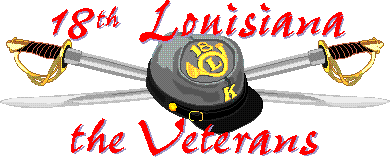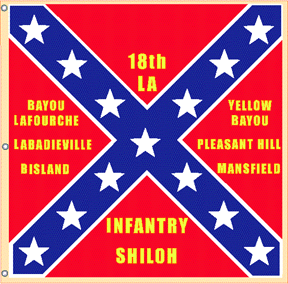SILAS T. GRISAMORE was born March 8,
1825, in Clark County in southern Indiana, about nine miles
from Louisville, Kentucky. He attended public school in that
county and later spent two or three sessions in the
Charlestown Academy, Charlestown, Indiana, while working as
a teacher elsewhere to earn his tuition. On October 23,
1846, Grisamore and a cousin, Dr. James H. Hazard, boarded a
steamer bound for Louisiana, where his brother had been
living for several years. He was hoping to make a living as
a teacher, while Dr. Hazard was planning to open his
practice in Natchez, Mississippi. The cousin arrived at
Donaldsonville November 3, and Grisamore soon settled near
Napoleonville. For a short while Grisamore tutored a young
lady on a nearby plantation.
On January 4, 1847, Grisamore began teaching a private
school. He worked hard at his task until his term ended in
August. Grisamore took a short vacation to his home in
Indiana, and when he returned to Louisiana found there was
no future in teaching. Unemployed until December 1847,
Grisamore finally was hired as an overseer on a plantation
owned by a man named Sims. This job lasted only nine months.
Grisamore sought employment unsuccessfully until early 1849.
In March of that year he began selling various goods from a
flatboat on Bayou Lafourche.
Grisamore had succeeded well enough in his new occupation
after a year's time that he was able to buy his own
flatboat, the Gen. Satisfaction No. 1. He would buy his
goods in New Orleans for sale on the bayou. In his diary,
Grisamore recorded, "My stock consists of Provisions,
Groceries, Liquors, Dry Goods, Fancy articles, Hardware,
Stoneware, Woodware, Crockery, Shoes, Boots, Hats, Tinware."
He even had two youths working for him. Finally in 1857
Grisamore settled permanently in Thibodaux, where he opened
a copper, tin, and sheet iron business with John Larkin. Two
years later Larkin sold his interest to W. H. Ragan and
George Westbrooks, and the firm was from then on known as S.
T. Grisamore & Co.
In his youth Grisamore was drown toward the Whig party.
He wrote in his diary on November 7, 1848:
To day I gave my first vote for President and Vice
President. I voted for Taylor and Fillmore. Whig from
principle, I have always preferred Henry Clay to any living
man for the highest office in the gift of the
people...Taylor I considered. as the saying is, a pill
easier to swallow than Cass.
When the Whig party broke up after 1854, Grisamore
apparently became a Democrat, but in the election of 1860 he
supported John Bell, the Union party candidate. Grisamore
opposed secession, but when Louisiana left the Union he cast
his lot with his adopted state. Originally enlisting in the
Lafourche Creoles (a volunteer company) as Fifth
Sergeant, he became First Sergeant of the company when it
was organized as Company G of the Eighteenth
Louisiana Infantry Regiment. On December 17, 1861,
Grisamore was elected Junior Second Lieutenant of his
company.
Upon the reorganization of the Confederate Army of
Tennessee in
May 1862, Grisamore was elected First Lieutenant of the
Lafourch Creoles, after refusing the rank of captain and
insisting upon the rejection of Captain J. Kleber Gourdain,
who was then absent, sick and wounded. Since April 1, 1862,
Grisamore had been acting quartermaster of the Eighteenth
Louisiana, and when elected First Lieutenant, he was
assigned to duty as assistant quartermaster by Lieutenant
Colonel Alfred Roman. In August 1862 Grisamore was appointed
captain and assistant quartermaster by Colonel Leopold L.
Armant, the appointment later being confirmed by Confederate
authorities in Richmond.
In April 1864, following the Battle of Mansfield,
Brigadier General Henry Gray, who was commanding the brigade
to which the Eighteenth Louisiana was assigned, appointed
Grisamore major and assistant quartermaster of the brigade,
a position which he held until the end of the war. For a
brief time in early 1865 he served as acting quartermaster
of the Confederate forces in the vicinity of Alexandria on
the staff of Brigadier General Allen Thomas. In August 1864
Grisamore had also served briefly as acting quartermaster of
Polignac's Division during the absence of the division
quartermaster. Grisamore turned down frequent offers of post
quartermasterships, preferring to remain with his command.
At the end of the war Grisamore returned to Thibodaux.
There he found his business in a state of ruin. After a few
months' service as deputy sheriff of Lafourche Parish,
Grisamore returned to his mercantile business to get it
going again. He continued to run his store until his death.
Governor James Madison Wells appointed Grisamore mayor of
Thibodaux July 13, 1865. He had previously served one term
in that office in 1860. The town was in bad condition, owing
a debt of more than $3,000 and existing on what taxes it
could draw from an impoverished people. The bridge over
Bayou Lafourche and the market house, one of the town's main
economic enterprises, had both been destroyed. With the
assistance of the town council, Grisamore was able to
improve the town's financial condition through wise money
management. The bridge and market house had both been
rebuilt by the time he left office July 3, 1868.
On June 4, 1866, Grisamore was elected to the Lafourche
Parish Police Jury and became its president. He served on
that body, with the exception of only a few terms, until
July 1892 and was its president except for one term. The
parish was in debt for more than $35,000 when Grisamore
first took office, but during his service the debt was
liquidated, many needed improvement were effected, and the
parish affairs were turned over to his successors free of
debt
and with funds on hand to run the parish in on a cash basis.
Grisamore proposed a plan of dividing the parish into
districts for the purpose of drainage. The plan resulted in
the restoration of thousands of acres of land to
cultivation.
Grisamore was appointed a member of the Parish School
Board in
1876 and served as President or Superintendent until
September 1888.
In 1859 Grisamore had been one of the organizers of
Thibodaux Fire
Company No. 1, and he was president or secretary of the
organization until his death except during the war years. He
served one term as chief of the Fire Department and was a
member of the body for several years. As a representative of
his fire company, Grisamore officiated as manager of the
Thibodaux Opera House for several years.
In 1853 Grisamore had become a member of Excelsior Lodge
No. 34, Independent Order of Odd Fellows, located in
Thibodaux. He withdrew in 1855 to become a charter member of
Assumption Lodge No. 43, I.O.O.F., located at Napoleonville.
After the war the two lodges were merged into one under the
title of Excelsior No. 34. Grisamore occupied all of the
offices of that lodge at various times and was its secretary
until his death. He became a member of the Grand Lodge of
Louisiana in 1859 and after 1865 never missed a session of
that body except when detained by illness. In 1872 he was
elected Grand Warden of the Grand Lodge, 1873, Deputy Grand
Master, in 1874 Grand Master, and was Representative to
the
Sovereign Grand Lodge from 1875 to 1879.
Grisamore served for many years either as chairman or
secretary of the Lafourche Parish Democratic Central
Committee.
For thirty years Grisamore was a member of St. John's
Episcopal Church and served as clerk, treasurer, and warden
of the church.
In August 1892 Grisamore was instrumental in forming a
camp of Confederate veterans. Upon the organization of
Braxton Bragg Camp
No. 196, United Confederate Veterans, on September 11, 1892,
he was elected commander. Every year thereafter he was
re-elected to that position.
Grisamore became co-editor of the Thibodaux
Sentinel in February 1869, assuming charge of the
English language department. He held this position until
August 1875 when he was replaced by Duncan S. Cage, Jr.
Shortly after Grisamore became co-eitor, the Lucy (La.)
Le Meschacebe, referring back to an episode during
the war wrote:
One day, it was at Texana, we saw Uncle Silas climb on
the roof of
an old shanty to see what Weitzel was doing. Birds were
flying in that region in the shape of Minni balls. We then
had a vague idea that our Uncle delighted in outlandish
situations. We are now satisfied that nothing can terrify
him. A man may escape Minnie balls; but the Printing Bill
never misses a conservative newspaper.
To this Grisamore replied in the Sentinel:
Uncle S. never feared unbogging a wagon Train, so long as
the ears of the lead mules and the driver's whip were
visible, and if his services will be on any avail in drawing
the conservative Party out of apathy and listlessness they
will be freely tendered.
Grisamore resumed his position as editor of the English
language department of the Sentinel in January 1877
and worked for the newspaper until July 1887 when it fused
with the Thibodaux Democrat. He continued to
contribute to the Sentinel until his death, his chief
contributions being a history of the Parish Police Jury down
to the 1880's and a column entitled "Fifty Years Ago," which
described Louisiana and Lafourche Parish during the 1840s.
During the last decade of his life Grisamore was the local
correspondent
for the New Orleans Daily Picayune and
Times-Democrat.
On July 24, 1897, Grisamore died at his home in Thibodaux
after a brief illness. He was buried in the St. John's
Church cemetery.


